Dear reader,
One year ago, I sat at the table in the casita where I was living in a rural village in mainland Mexico, and decided to start a Substack. I had so much to say.
I was struggling to say what I wanted to on Instagram. I felt constricted by algorithms, stories, and teeny-tiny captions. I was also admittedly a bit wary of the attention I was getting.
I made these airport food collages to describe how it felt to express myself there:
Before Substack, I had written a few essays and sent them to a small email list that was synced to my online store, some of which I plan to edit and re-release here. They’re good, though very earnest and very green. I’ve enjoyed reading them again to see how far my writing has come in one year, much like I can see the difference between my recent posts on Substack and the ones I wrote last spring.
I did not know that one year later, I would have almost 11,000 readers. I did not know that a devoted writing practice would help me fine tune the process that is living my life. I did not know that the more I write, the more I want to write. I did not know that so many people, people I may never meet, would support me to do that writing, and that it would be the best thing that ever happened to me. I was just doing what I had to do.
For weeks, I’ve sat facing the wall or stood at my desk in communion with my color pencils. I’ve been working from dawn until dusk on a series of drawings for an upcoming solo exhibition at Cruise Control Gallery in Cambria. I’ve made coffee in my bathroom to avoid human contact while in the flow. Sometimes I’ve worked in silence to hear the birds or listen to Gabriel play his guitar into the field. Other times, I’ve used headphones on reflective pedal steel tracks and energized dance hits.
I love the deadline that an exhibition presents me with; I think it’s how I work best. I also work best when I am not tempted to pick up my phone every thirty seconds or to create and share things on a schedule of immediacy, which is why the last time I was on Instagram, there was snow on the ground. Nowadays, the temperature is such that we are summoned to lay nude on the brick by the front door to feel warmth concentrated against our backs.
My last show of drawings was in December of 2021. Written down, it feels like a perfectly balanced amount of time transpired between that show and this show. I rested my hands, I drove thousands of miles, and I gathered stories, lessons, and pieces of myself. But it was also just enough time for me to feel like I had fallen off the horse.
Getting back on the horse is hard, but not because I’ve fallen off. It’s hard because it requires me to get off of the other horse I’ve been riding, the horse called Be an Artist While Using Social Media All of the Time.
Since logging off, sales in my online shop have gone down 81%. Facing this number makes me squirm, wherein thinking about not being able to support myself as an artist feels just as distracting as being on Instagram; it just tastes different.
I’ve wondered if my drawings will amount to anything, I’ve wondered if it even matters. I’ve wondered if I’m enjoying the process, and if it’s been worth it. I’ve wondered how I measure worth.
Yesterday, I decided to lay every drawing I’ve made thus far out on the floor so that I could survey what’s happened. I know that I’ve been actively pursuing drawings since January, but I did not know what that really meant until I saw them together.
I was moved to tears. Proud not for the drawings, though they are good, but for knowing the consequences of a social media break in my field, and stepping out of the void anyway. I was proud of prioritizing my creativity over earning money, despite the fact that scarcity and my conditioning tells me not to. I was proud that even as the sensation of feeling financially pinched grew, I continued my projects anyway. It is important to note that I was only able to navigate such a critical drop in my sales because I had previously burnt myself out working to save money.
What’s really miraculous is just the fact that I was proud of myself. It’s not a state of being I experience often. I don’t usually lay everything I’ve made out on my floor and let myself be awed. It felt really good, maybe because of the novelty of the sensation itself. I’m often busy feeling the loop of other emotions I’m comfortable with and used to having. Pride is not one of them.
The rest of today’s letter features reflections from almost every single post I’ve made on Substack. This letter is my bedroom floor, and the following writings are the pages of my notebook strewn about. I’ve pulled the best bits out and there’s still a lot of text. I’m self-conscious about it, but I hope you will take the time to read it, especially if you are a free subscriber and haven’t been able to read everything, or are simply new around here.
Thank you for being loving witnesses. I hope this letter reminds you to be proud of yourself, even if you don’t yet know what you’d lay out on your bedroom floor. You don’t have to do anything to be proud of yourself. I’m still working on internalizing this instead of all the other garbage messages left over from family and ~society~.
Thank you for being a reader.
APRIL
In April, I wrote about being raised devoted to men, looking for love in Mexico City, and my insatiable God-sized hole.
“My getting on a plane for the sake of kinship with a man is an act of hope and spontaneity, but it is also an act of looking for something I’m convinced I can’t give to myself, or in different terms: what god can’t give to me.”
MAY
In May, I wrote about how making art is often not sexy or fun, and that I don’t believe in creative slumps.
“I think often what people call a “slump” or “block” is actually another name for the unwillingness to do work that is nothing like the sexy work mentioned above. Making art is hard. It looks like sitting all alone and trusting yourself enough to silence your very loud inner critic. It looks like giving yourself the time and permission to practice something most of us have been conditioned to think is indulgent or should come last, after all of the other to-do’s have been crossed off. It often looks like embracing a big mess — spending time doing something you are only just beginning to figure out; this is extra scary. It requires deep listening, sitting still, and befriending the resistance that will follow you everywhere you go. Everywhere.”
In May, I also wrote about living alone at the base of a mountain in the jungle of Mexico, letting a man from LA whom I had never met come to visit, and having sex too soon.
“Two days in a row we ate breakfast on the patio of a family residence in town: no menu, no formalities, just a woman in florals offering eggs and beans, warm tortillas wrapped in cloth and set in a basket, fresh juice made by a man with one eye, cafecito. Eating and talking, spooning small bites of egg and chopped tomato and a swipe of beans into the tortilla folded in the palm of my hand. Love is resonance with source, it has nothing to do with the object of attention. I love it all, I can die here.”
JUNE
In June, I wrote about driving back to America, about the Great Love Deficit, and about love being all around us, even if it is not about us.
“I will not calibrate my capacity to give based on what the world is doing or what’s beneath my feet. Love, even if I can’t see, taste, or touch it. Love, even if everything around me is unfolding like its antithesis. Love, even if I’m standing in the arena alone a la Brené Brown. Love, even if it is not about me. I think there is a Great Love Deficit because most of us have learned to regulate the way we engage with love to what other people are doing and how they are doing it. Is this not the definition of a dead-end relationship? Love, contingent on the wellbeing and emotional availability of humans in order to flow freely through you. What about when the average person is tired, weary, and has nothing left? Where does that leave us? Love is not just about people and what they do. Love is all around us, even if it is not about us.”
In June, I also wrote about fantasy in new relationships, not measuring a relationship’s success by its duration, and what comes up when things with somebody new don’t work out.
“The problem with things not working out in the escalator version lies in the fantasies I keep and my attachment to them. The problem lies in the expectations I have that go unmet and in my unwillingness to sit still long enough to meet those expectations myself. The problem also lies in the fact that there are things I cannot do for myself. Intimacy, affection, and touch are vital, and they require another person. I want all of this in my life, but I’m finding it hard to access without a romantic relationship. My friends often carry the torch, but have they signed up to spoon me, rub my forehead, or go to my estranged brother’s wedding with me? I guess I’ve never asked.”
“My desire to bring love into me is about me, and no one else. I can’t speak for you; maybe you love the way vengeance, spite, and exclusion lands in your body. While I believe feelings like these occur naturally, my experience of holding them for too long feels like I’m metamorphosing into a dense, impassable turd. I don’t have much time here; I want to soak up every morsel of beauty offered (i.e. clouds, friends, rainbows, kisses). I am so much spongier when my body feels like a smile.”
JULY
In July, I wrote about moving onto 120 acres in central California to live with eight other people, and the psychic relief of living without wi-fi or service for a little while.
“I’ve now spent more time on earth being connected than not. My boundless access to information or other people, and my own “being accessible”, has been an omnipresent standard in my life. With the exception of meditation retreats, weekend camping trips, or the years I lived in Vermont, I’ve been available to an invisible network without much effort — yes, even in rural Mexico. This decades-long circumstance of being a user is so baked into my corporeality that when it becomes severed, I notice.”
In July, I also wrote about my first date with T., and how I actually hate having crushes.
“I meet a man and I get curious. I share myself — sometimes too much. I tell my friends about them, often too early. Generally, things quickly become physical (usually against my intuition) before our time together has allowed for us to know, and therefore care about, each other. This happens even when I think I’m moving slowly. Usually a relationship is a mutual goal, but lately all my crushes tend to collapse. I’m no longer interested in excavating anyone out of their emotional stuntedness.”
AUGUST
In August, I wrote about my decade-long friendship with Hannah, who saved the day when whatever family structure I had left completely disintegrated.
“I note the moments when life pushes against my biases and challenges my lonely constitution. Hannah’s arrival following my mother’s decline has served as such a moment. Hannah’s love prohibits me from feeling alone. There are friendships I act out in, friendships I veil myself to, and friendships that drop off. My friendship with Hannah is no exception to any of these issues, but what persists is our continued choosing of one another, as if our magnetism is of a greater force than preferences, conditions, or opinions. We always find our way back.'“
In August, I also wrote about ditching T. in the middle of the night, the pressure to have sex and prematurely feign intimacy in new relationships.
“I’ve waited, perhaps not very patiently, to meet somebody I really like. Now that I’ve met someone, dashing to the finish line is a recurring topic of conversation. Sex is one way I’ve been taught to measure love and security, and so even when there’s nobody around to ask me how things are progressing, I still somehow find a way to overthink it. But are these thoughts really mine? Have I devoted myself to translating my own beliefs and attitudes around sex? What is sex really offering?”
SEPTEMBER
In September, I acknowledged the chasm between my ability to express myself creatively to thousands of people, and my paralyzing insecurity in romantic relationships. Appropriately, I acknowledged a reader-submitted question about where I get the guts to release work into the world (see: adversity brings courage).
“I produce my craft and share so earnestly largely due to the absence of my father. No judgment or rejection from my audience will ever touch the heartbreak of that deficiency — which is, in a sense, liberating. I am grateful for the current of suffering that courses through me, because of his conscious decision to abandon me as his daughter. It confounds and plagues me; there is no other way to hold it. But this ache is also what frees me. His unwillingness to extend love is painful enough that it forces perspective.”
OCTOBER
In October, I wrote about not talking about men for three days while traveling on horseback through the Sierras with two other women.
“I want to get better at being in love — not fight it tooth and nail the entire time because of what it brings up or asks of me. I talk about it to feel closer to an answer that I know, deep down, will aways elude me (isn’t that part of the fun?). I also talk about it because it makes me feel like I’m becoming more self-aware and actively healing something broken. But am I any better at having relationships because of it? Do I feel better?”
NOVEMBER
In November, I wrote about the paradox of being a heterosexual woman who shows up in relationships with men under the umbrella of the patriarchy. This post is now available for all subscribers.
“Knowing what I do, for me to choose a relationship with a man in the context of patriarchy is to choose a practice of self-erasure; to face death while being asked to embody life. It is for me to be everything and nothing, to contend with the expectation to cultivate care and interconnectedness in a system designed against me having the energy to do so.”
In November, I also wrote a manifesto about my relationship to Instagram.
“This brings me to the one thing I try never to forget, which is that every time I post something, I steal someones attention. I rob someone of a moment of their life. When I put it that way, really nothing I share feels worthy of that. I just want everyone to have all the time in the world to pursue their dreams or rest unbothered by information and images. I don’t want to be the thing that stands in the way of that peace, even if it’s just for fifteen seconds. So before I post, I try to ask myself, “Is this worth stealing someones attention for?””
DECEMBER
In December, I started a month-long deep dive into using needs as a framework in relationships.
“What if my partner’s constitution makes it hard for them to understand or satisfy a need of mine? Is the dissonance a place of incompatibility? Is it a reason to apply pressure on my partner or quit the relationship, or is it merely an indication that I should devote energy towards taking care of the need myself? Can I let go of getting the need filled by my partner and perhaps be magically surprised when other people give me that ingredient?”
I also realized I did not know what my needs were and practiced asking for a need to be met.
“Why is it so much easier for me to assume the worst and pin myself against somebody, instead of just communicating a need in the first place and going from there? Is it because asking for what I need feels too vulnerable? Is it because someone might actually fulfill the need, and with it offer a sense of peace that I’m unwilling to hold?”
JANUARY
In January, I understood that the idea I have of myself (and how hard I am on myself to be her) is the root cause of all of my misery, especially in romantic partnership. This was one of my most popular posts.
“It turns out that life feels like shit when I berate, bully, coerce, or shame myself into being “someone better” every day. It also turns out that the unforeseen variables characteristic of travel are exactly what summon the unrealistic version of myself into view before blasting her to bits. And when I realize my ideal version doesn’t stand a chance in a certain scenario, things get ugly. I have an idea of myself, God laughs.”
In January, I also wrote about being in a state of regular decision fatigue and being disappointed when things don’t go according to plan.
“Of all the pivotal points, it was this exact moment of our trip that I went from being disappointed to disheartened, and I started to plan my escape from everything I was trying to be and everything T. was implying I should be. I announced that, effective immediately, I was driving the entire fifteen hours it would take us to get home.”
FEBRUARY
In February, I wrote about finding a book at a thrift store in New Mexico that helped T. and I learn more about why verbally processing my feelings is about finding relief and not solutions.
“If a member of society is denied the security of basic rights and resources, self-preservation and prosperity depends on establishing other networks of care. How do we get people to care about us? How do we belong to one another? Perhaps it is through witnessing each other’s stories — being moved enough to listen, and soft enough to remain unshaken.”
In February, I also wrote about dealing with my mother’s dementia and I started thinking about the unrealistic expectation that we might ever be securely attached.
“I’ve dug deep and named these patterns, but never for the sake of simply understanding myself as I am right now. I’ve always used the framework as a means to an end: to heal, to improve, to help transform myself into a more solid, transparent, and consistent version. Security appeals to me. I imagine I would spend less time stewing in a pot of my own suffering if I were more secure. But how realistic is it for me to seek out security?”
MARCH
In March, I also wrote about how Instagram is not the problem and how being mortal is actually just really hard.
“As the words were coming out of my mouth, I was like, are you okay? And for the love of God, bless T. for not making me feel completely insane, although I think he had every right to while we sat outside of the Goodwill and I asked him to look into his crystal fucking ball of Will you or won't you abandon me and in which method?”
In March, I also wrote about taking LSD with my partner and thought about how consent is not linear, nor is it unconditional.
“When Hannah and I revisited the way we’ve always done things, it prompted me to think about how I had objectified our friendship. It seems that even with the best intentions, it’s easy to think of our relationships with other people as amorphous, blob-like containers — as things that we have, as objects, as possessions.
We lose sight of the fact that the relationship is nothing without the other person — a person that frankly, has nothing to do with us, and as I mentioned before, is the essence of change.”
In March, I also opened up about living in the community that I do, and asked you to tell me about your one and only directive, your urgent and ongoing practice.
“I’m insecure that people will see me as a negative, no-saying stinker, but what if my “no’s” are what make me a cautious and protective friend, one who is sensitive to the individual needs of a group and sees a nuanced energetic picture?”
APRIL
And just last week in April, I recorded a 10-minute podcast with myself about taking things one day at a time as an attempt to GET IT *clap* THROUGH *clap* MY HEAD.
See you later this week with a new essay.
Love,
Anna


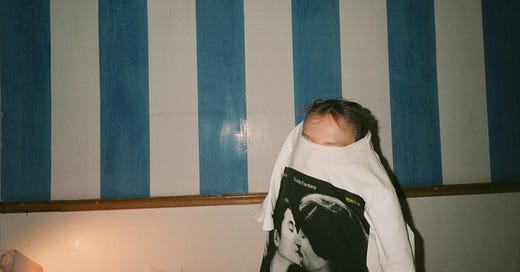


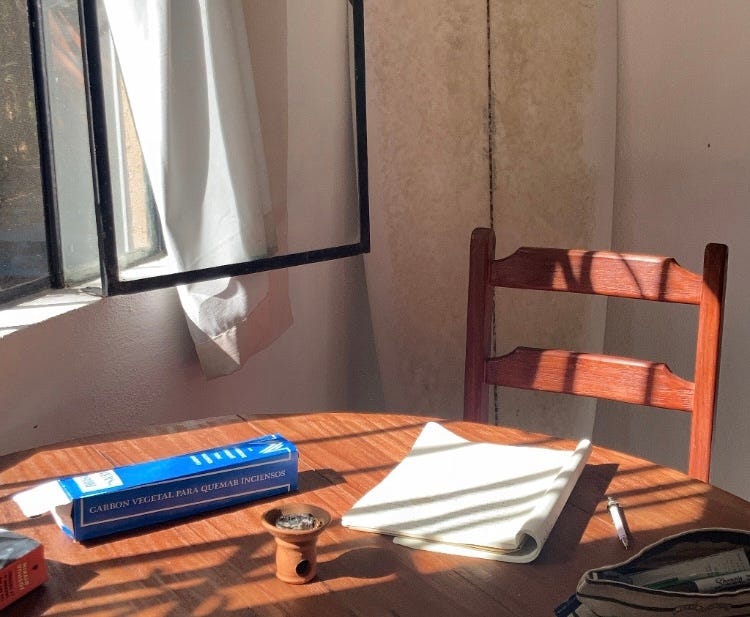
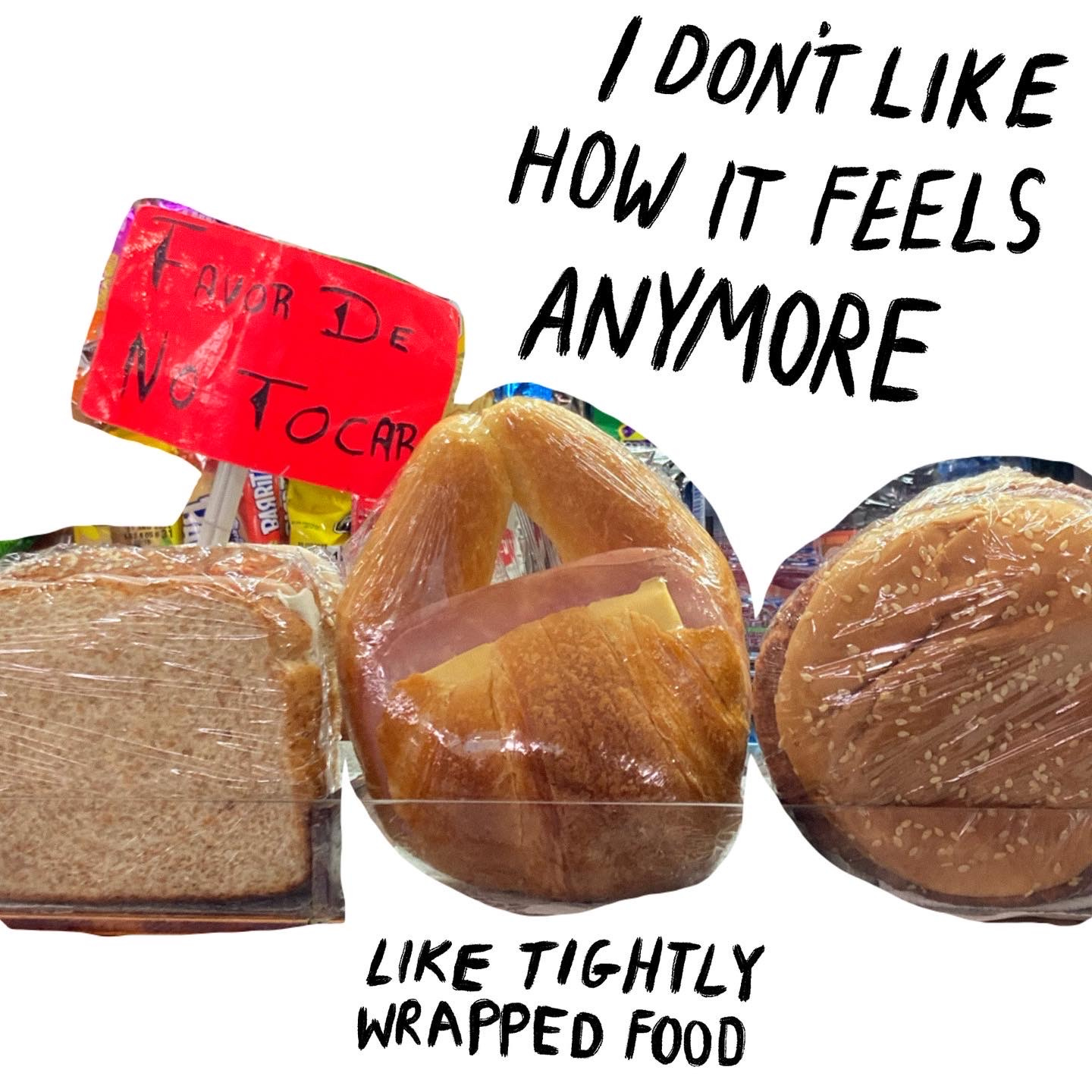
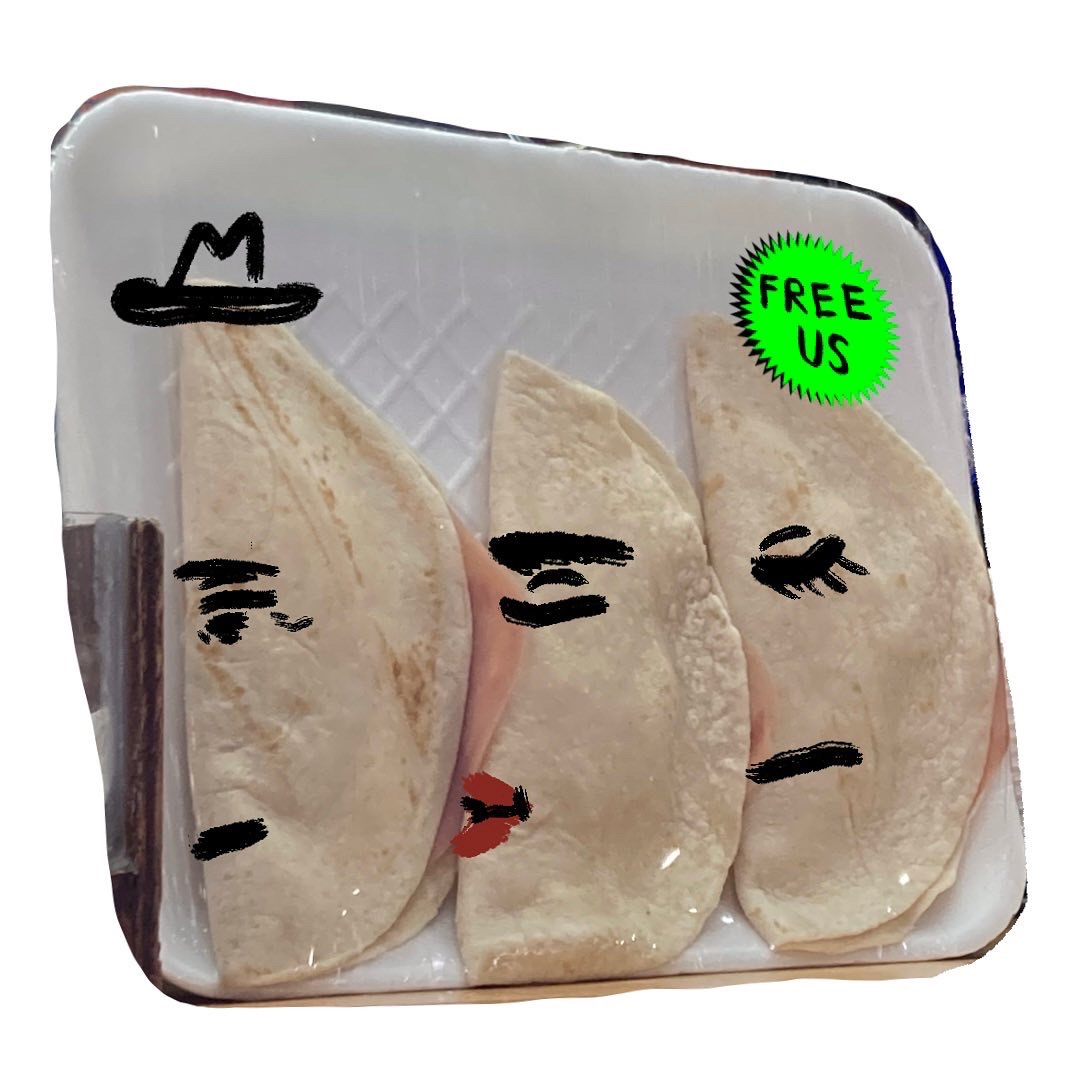
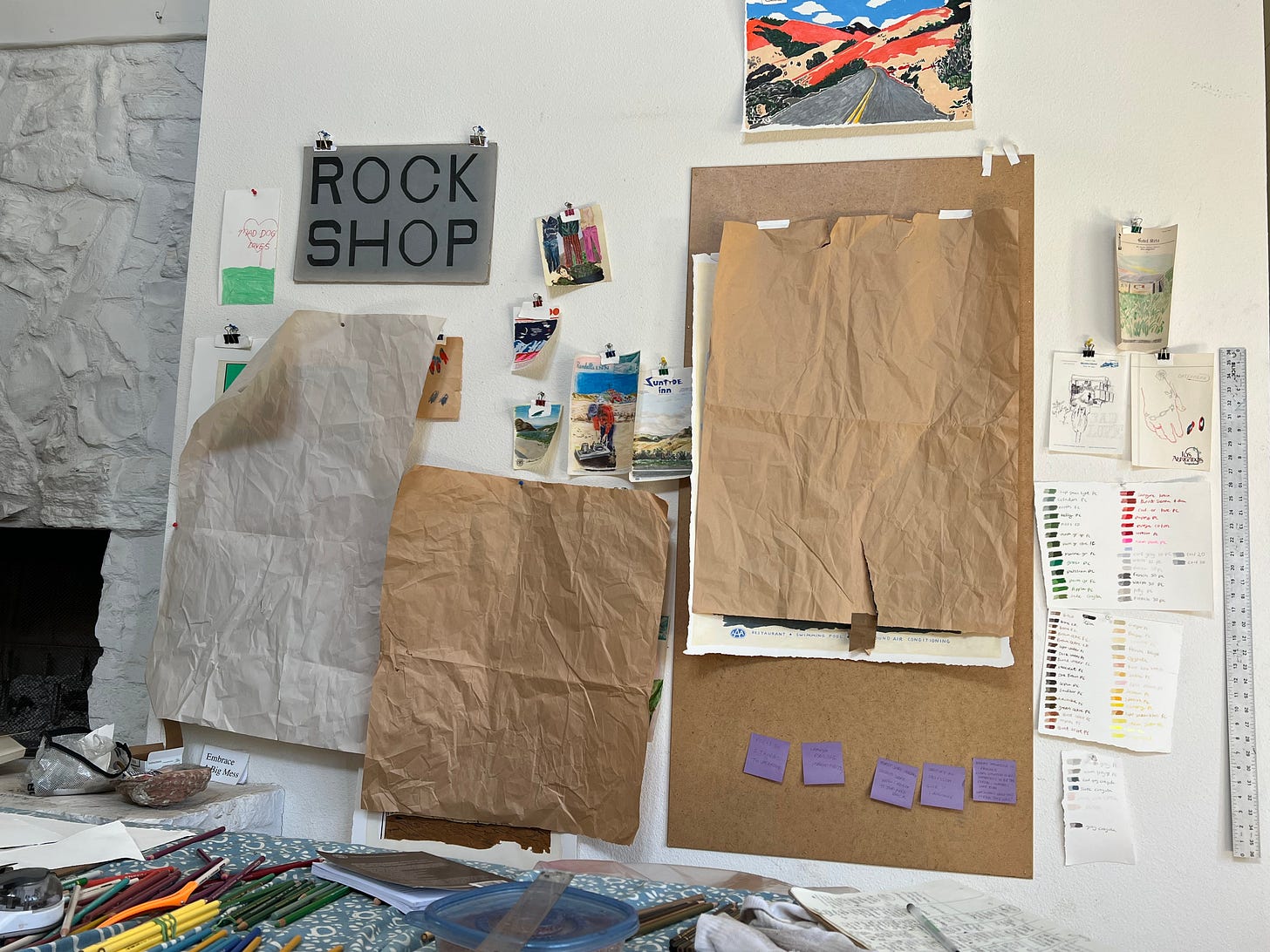
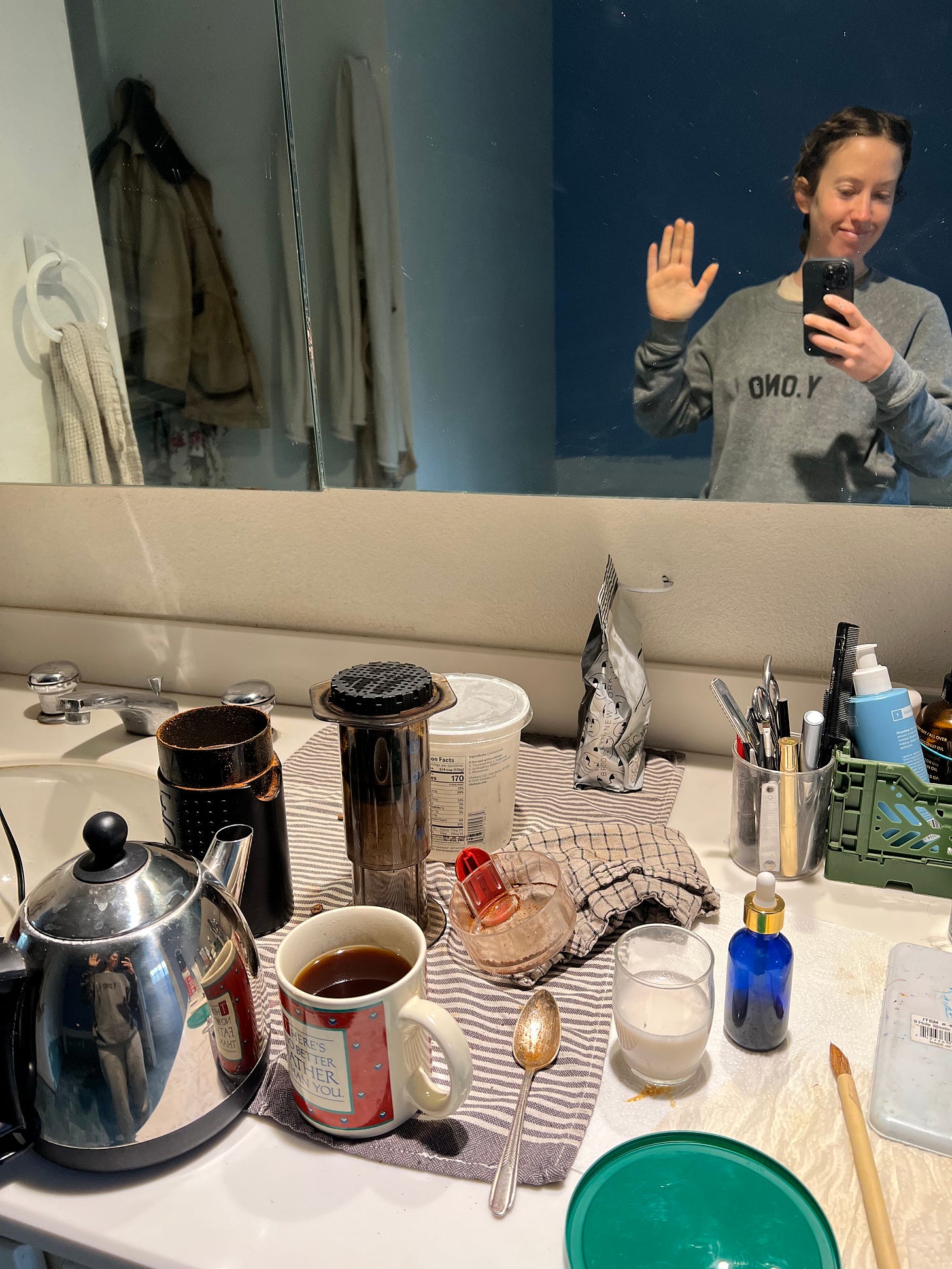

I really, really love this. Especially May. Thank you for existing and doing your work and the willingness to trust yourself. Huge fan here lol.
Your bathroom coffee made me smile so big. What a real and beautiful and much needed (for me) reminder that devotion to our art sometimes requires the changing of our small rituals and patterns and locations of being. I am so grateful you started this Substack; your words have been some of my favorites over the past year.